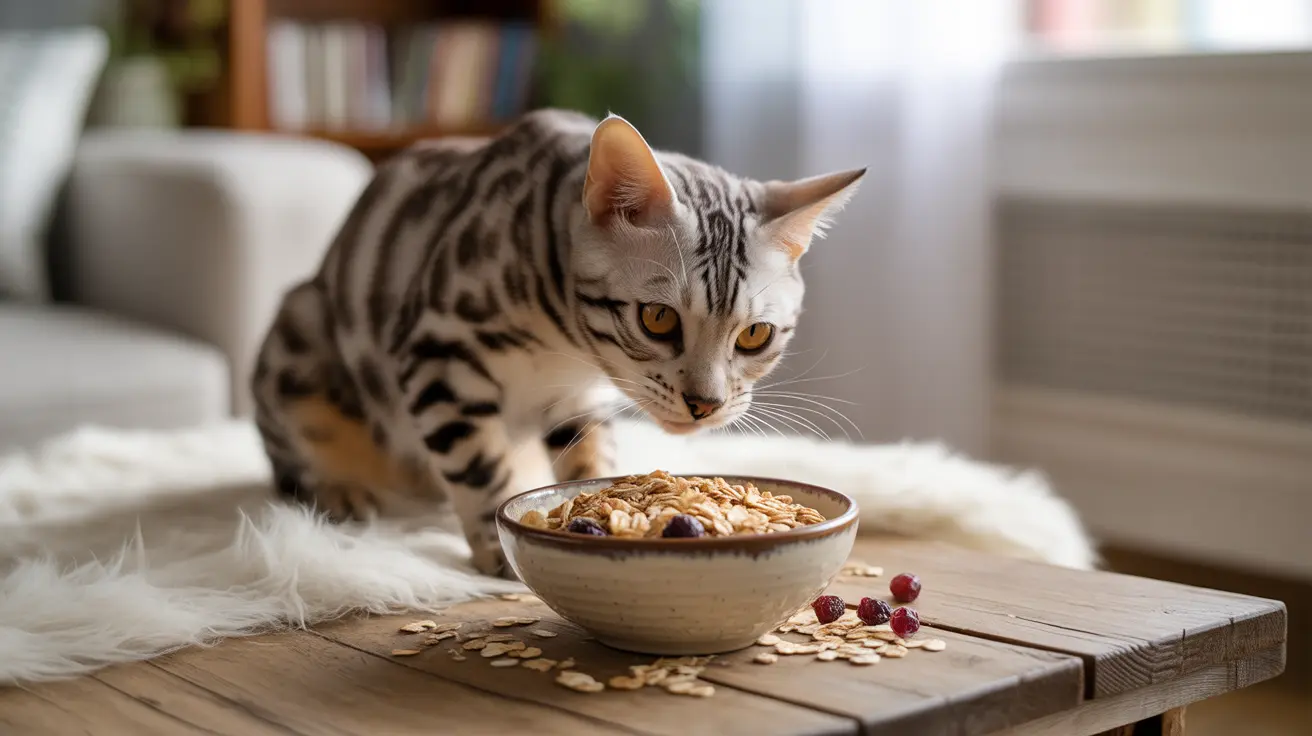Understanding the Risks of Feeding Granola to Cats
As cat owners, we often wonder if sharing our human snacks with our feline friends is safe. When it comes to granola, the answer requires careful consideration. While not immediately toxic in its plain form, granola presents several potential health risks for cats and offers no nutritional benefits to these obligate carnivores.
Before you share that breakfast bowl with your curious cat, it's crucial to understand why granola isn't a suitable treat for your feline companion and what dangers certain ingredients might pose.
Why Granola Doesn't Fit a Cat's Dietary Needs
Cats are obligate carnivores, meaning their bodies are designed to process and utilize nutrients primarily from animal sources. Their digestive systems aren't equipped to handle the high carbohydrate content found in granola, and they lack the necessary enzymes to properly digest many plant-based ingredients.
Unlike humans who can benefit from the fiber and nutrients in granola, cats receive no nutritional value from these ingredients. In fact, the high sugar and carbohydrate content can lead to weight gain and potentially contribute to feline diabetes.
Dangerous Ingredients in Granola
Common Toxic Components
Many granola varieties contain ingredients that are toxic to cats, including:
- Raisins and other dried fruits (can cause kidney failure)
- Chocolate or cocoa nibs (toxic due to theobromine)
- Xylitol and artificial sweeteners (can cause liver failure)
- Macadamia nuts (toxic to cats)
Problematic Non-Toxic Ingredients
Even ingredients that aren't strictly toxic can cause issues:
- Nuts (choking hazard and high fat content)
- Honey and added sugars (contribute to obesity)
- Seeds (potential digestive blockage)
- Dairy products (many cats are lactose intolerant)
Health Risks and Warning Signs
If your cat consumes granola, watch for these symptoms:
- Vomiting or diarrhea
- Lethargy
- Loss of appetite
- Difficulty breathing
- Excessive thirst or urination
Any of these symptoms following granola consumption warrants immediate veterinary attention, especially if toxic ingredients were present.
Safe Alternatives to Granola for Cats
Instead of granola, consider these veterinarian-approved treats:
- Commercial cat treats formulated for feline nutrition
- Small pieces of cooked, plain meat
- Freeze-dried meat treats
- Specialized dental treats approved by veterinarians
Frequently Asked Questions
Can cats safely eat plain granola, or is it harmful to their health?
While plain granola isn't immediately toxic, it's not safe or healthy for cats to eat. The high carbohydrate content can lead to digestive issues and contribute to obesity, while providing no nutritional benefits for cats.
What ingredients in granola are toxic or dangerous for cats to consume?
Several common granola ingredients are toxic to cats, including raisins (can cause kidney failure), chocolate or cocoa nibs (contains toxic theobromine), xylitol (can cause liver failure), and certain nuts like macadamia nuts.
What symptoms should I watch for if my cat eats granola with nuts or dried fruits?
Monitor for vomiting, diarrhea, lethargy, loss of appetite, excessive thirst, or difficulty breathing. If your cat consumed granola with toxic ingredients like raisins or chocolate, seek immediate veterinary care.
How can feeding granola to cats affect their digestion and risk of obesity?
Cats lack the enzymes to properly digest high-carbohydrate foods like granola. Regular consumption can lead to digestive upset, weight gain, and increase the risk of feline diabetes and other obesity-related health issues.
What are safer treat alternatives to granola that meet a cat's dietary needs?
Safe alternatives include commercial cat treats, small pieces of cooked plain meat, freeze-dried meat treats, and veterinarian-approved dental treats specifically formulated for cats' nutritional needs.
Conclusion
While it might be tempting to share your granola with your cat, it's best to avoid this human snack entirely. The risks far outweigh any perceived benefits, and there are many safer, more appropriate treat options available that are specifically designed for feline nutrition.
Always consult with your veterinarian about appropriate treats for your cat, and stick to a diet that supports their carnivorous nature and specific nutritional needs.






